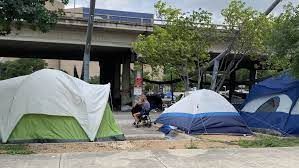Helping The Homeless Deal With The New Anti-Camping Statute
What we can do as attorneys.

Camping Ban HB 1925 prohibits camping in a public place not specifically designated for camping by homeless individuals. TDHCA must approve all designated areas. Camping is a temporary residence in a place that may include a tent, tarpaulin, lean-to, sleeping bag, bedroll, or blankets.
This act took effect Wednesday, September 1, 2021. A violation of the ban can result in a Class C misdemeanor with a fine of up to $500. If a camper does not relocate, they face arrest.
Homelessness is now going to be criminally punishable in an age where COVID-19 has made housing scarce and shelters unsafe due to the risk of exposure.
This criminalization will also affect their ability to have a valid Driver’s license or ID because if they are not able to pay the fine, they will get holds and warrants on their license.
The payment of outstanding warrants and tickets can be an insurmountable obstacle to a person living below the poverty level. They will have to make a choice between paying their portion of the rent, food for their family, their utility bills, or paying this $300 ticket. Our homeless clients face an impossible choice because they do not have much money at any one time, and if they do, they are going to use it for a hot meal or shower.
Over 50% of the legal needs of the homeless are related to their lack of eligibility to obtain a driver’s license and other identification documents. A valid driver’s license is a threshold to employment, housing, and access to state and federal benefits.
The camping ban will add to the already existing barriers the homeless population faces. Due to the lack of other safe options, the ban will also serve to punish individuals repeatedly before municipalities are able to find ways to divert people to TDHCA approved sites.
We could really use your help to assist clients who face this challenge as well as other Class-C misdemeanors. Help us advocate for our neighbors who are unable to advocate for themselves.
Finding of Indigency
On behalf of a client, or with advice to a client, a person may inform the court of their inability to pay by requesting a finding of indigency. Many courts have their own forms to fill out and present to the judge, others will have them make the request at a walk-in docket.
When making the argument before the court, the client should explain their income, household size, any public benefits they receive, and their living situation. Most clients have to stay with family and friends, live in transitional housing, or are living in a shelter. All of these descriptions would qualify them as homeless and the court should be aware of their unstable housing situation so that the judge can grant the finding of indigency.
Some courts may dismiss the citation, but keep in mind, many courts will suggest a payment plan. That is not a solution for our clients who have no income or very little income. They can reject the payment plan, state they cannot afford that, and request a waiver or community service instead. A disabled person who can provide proof of a disability with a doctor’s note or disability benefits award letter is most likely to succeed in getting the court to waive the fines and fees.
In most courts, a plea may be required, if not already entered, in order to obtain a finding of indigency for a Class C misdemeanor fine. If that is the case, a plea of no contest should be entered. For most of our clients in these situations, the conviction is not as big an issue as the payment because a payment may never be resolved while a suspension has an end date. In addition, if the plea results in a suspension, people can obtain an Occupational Driver’s License for the duration of the suspension. If the prosecutor offers a deferred AND the judge will allow community service instead of payment of the deferred fee, then that is a great outcome as well.
If you are advocating and on record for someone, you could also meet with a prosecutor before approaching a judge to see if there are any grounds for dismissal. The most common ground for dismissal arises if the citation and warrant are more than 10 years old as the evidence to prosecute would be stale, if at all in existence. Prosecutors are also able to reduce the fine and dismiss the warrants before you approach the judge for a finding of indigency. This ensures that if community service is ordered, the client receives the lowest number of hours possible, which increases the likelihood of being able to complete the hours ordered. The prosecutor or the judge may also dismiss the offense simply as a “best interest of justice argument.”
Community service cannot be ordered at a rate higher than $12.50 per hour of the remaining sum of fine. A court may order less, but not more. Community service can be achieved statutorily at any non-profit organization, or 501 3 (c). With prior approval, courts may also accept time spent on work & job skills training programs, GED programs, drug and alcohol programming, rehabilitation programs, counseling Programs, Mentoring program, or similar activities. The court will want to know if the client lives outside of the court’s jurisdiction and needs to complete their hours closer to home. The client must complete the hours by the deadline ordered, however, extensions may be granted for good cause.
Brettney A. Moore, Staff Attorney, Legal Aid of NorthWest Texas